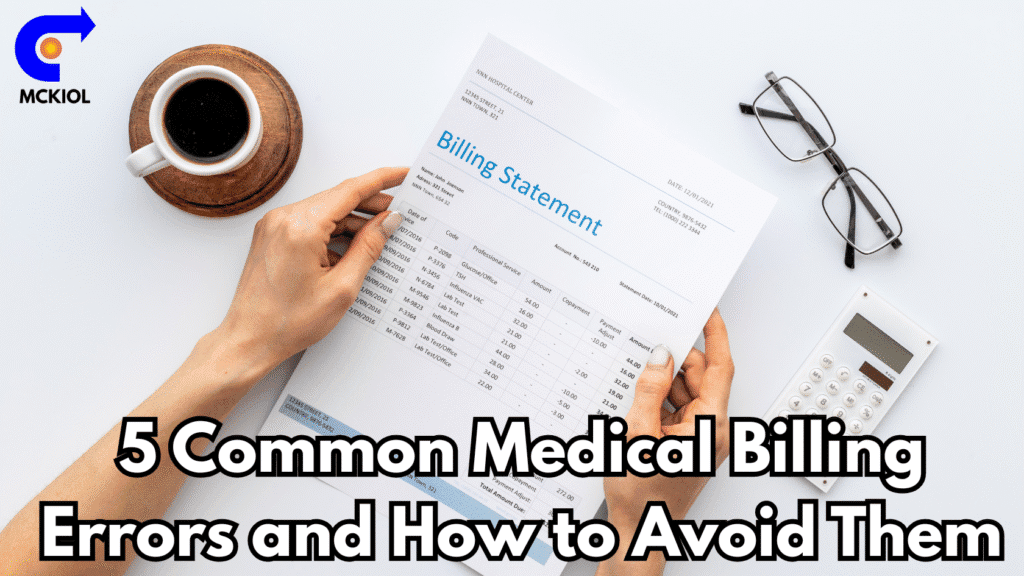

We all know the dedication it takes to run a medical practice – from patient well-being to clinical excellence. But what about the headaches behind the scenes? Specifically, healthcare billing can often feel like a maze, full of intricate rules and potential pitfalls. When medical billing errors creep in, they don’t just create administrative snags; they can seriously undermine your practice’s financial health and even leave patients scratching their heads. You pour your heart into caring for others, and you deserve a billing process that reflects that effort, ensuring you’re compensated accurately and on time.
You work incredibly hard to provide top-notch care, and you deserve to get paid accurately and on time for it. The good news? Many common billing mistakes are entirely preventable. Let’s uncover the top five culprits and, more importantly, discuss actionable strategies to keep your revenue cycle management robust and efficient.
1. Inaccurate Patient Demographics & Insurance Verification
The Mistake: This might seem basic, but it’s astonishing how many claims get denied because of a misspelled name, an outdated address, an incorrect date of birth, or – the big one – unverified insurance information. A patient might present an old insurance card, or their policy might have changed since their last visit. Sending a bill to the wrong insurer or with incorrect patient details is a sure path to denial.
How to Avoid It:
- Verify, Verify, Verify: Make insurance verification a standard part of your patient intake process before the appointment, if possible. Use online portals or direct calls. Don’t just rely on what’s on the card.
- Double-Check Demographics: Have staff confirm patient name spelling, address, and date of birth at every visit. A quick verbal confirmation can save hours later.
- Training is Key: Ensure your front desk staff are fully trained on the importance of accurate data entry and the verification process.
2. Coding Errors: The Devil’s in the Details
The Mistake: Medical coding is a language all its own, full of CPT, ICD-10, and HCPCS codes.
Common billing mistakes here include:
- Upcoding: Billing for a more complex service than performed. (This can lead to serious legal issues!)
- Undercoding: Billing for a less complex service than performed, leading to lost revenue.
- Incorrect Modifiers: Missing or misapplying modifiers that describe unique circumstances of a service.
- Lack of Specificity: Using general codes when a more specific one is available.
How to Avoid It:
- Invest in Continuous Training: Coding rules change frequently. Regular training and certification for your coding staff are non-negotiable.
- Provider Documentation: Encourage meticulous and detailed clinical documentation. The code must precisely reflect what’s documented. “If it’s not documented, it wasn’t done!”
- Utilize Smart Software: Good billing software often has built-in code scrubbers and alerts for potential errors.
- Regular Audits: Conduct internal or external audits of your coding periodically to catch patterns of errors.
3. Missed Filing Deadlines
The Mistake: Every insurance payer has a strict timeframe within which claims must be submitted (e.g., 90 days, 180 days, or a year from the date of service). Letting claims sit for too long is a sure way to have them denied, and once that deadline passes, there’s usually no recourse. This is a silent killer for revenue cycle management.
How to Avoid It:
- Timely Submission Protocol: Implement a strict protocol for submitting claims daily or within a few days of service. Don’t let them pile up!
- Automated Reminders: Use your practice management or billing software to track submission dates and flag claims nearing their deadline.
- Dedicated Follow-Up: Assign a team member to regularly review aged accounts receivable and identify claims that haven’t been submitted or followed up on.
4. Insufficient or Absent Documentation
The Mistake: This goes hand-in-hand with coding errors. An insurance payer might deny a claim not because the code is wrong, but because the clinical documentation doesn’t adequately support the services billed. If the notes don’t justify the necessity or complexity of the procedure, the claim is at risk.
How to Avoid It:
- Thorough Clinical Notes: Emphasize to providers the importance of clear, comprehensive, and legible clinical documentation that supports the medical necessity of every service rendered.
- Template Utilization: Use electronic health record (EHR) templates that guide providers to include all necessary details for common procedures.
- Linkage: Ensure diagnosis codes (ICD-10) correctly link to the CPT codes for the services performed. This “medical necessity” connection is crucial.
5. Ignoring Denied Claims & Underpayments
The Mistake: It’s easy to get overwhelmed by denied claims and just let them sit, especially if they’re for smaller amounts. But every denied claim is lost revenue! Similarly, accepting an underpayment without investigation leaves money on the table. This passive approach significantly cripples your revenue cycle management.
How to Avoid It:
- Dedicated Denials Management: Don’t just file denials away. Assign a team or individual specifically to manage denied claims.
- Root Cause Analysis: For every denial, identify why it was denied. Was it a coding error, missing information, or something else? Learn from it.
- Prompt Appeals: Understand the appeal process for each payer and act quickly. Most have strict appeal deadlines.
- Contract Review: Regularly review your payer contracts to understand agreed-upon reimbursement rates and identify underpayments.
Don’t Let Billing Headaches Cost You!
Navigating the complexities of medical billing errors doesn’t have to be a constant struggle. By understanding these common billing mistakes and implementing robust strategies, your practice can significantly improve its revenue cycle management and reduce financial stress.
You’ve got enough on your plate taking care of patients. Imagine having a partner who precisely handles your medical billing, allowing you to focus on what you do best. At MCKIOL, we specialize in identifying and preventing these very issues, ensuring your practice receives accurate and timely payments. Our team is dedicated to providing efficient, human-centric solutions that keep your financial health strong.Is your practice ready for a billing solution that truly works? Discover how MCKIOL’s expert medical billing services can bring efficiency and clarity to your financial operations. To discuss how we can support your unique needs, contact our experts today! You can also explore our website to discover the full range of our services and solutions.




